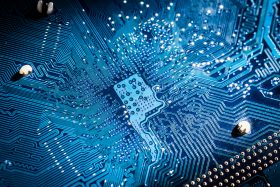Army Paper Points to TSMC's China Challenge
(Ed note: This piece is an Op-Ed, in case you haven't noticed.)
A widely read paper published by the U.S. Army War College Quarterly in November 2021 suggests that the U.S. should threaten to demolish the facilities of Taiwan Semiconductor Manufacturing Company (TSMC, NYSE: TSM) in a “scorched earth” move to avoid war with China.
As outrageous as that sounds, the paper, titled “Broken Nest: Deterring China from Invading Taiwan," highlights the enormous power TSMC has acquired over world economies. And it indicates it may be time to take action -- though not of the shoot-yourself-in-the-foot kind the academics suggest.
TSMC: Too Big to Be Safe?
TSMC is one of the most valuable firms on the planet, with a market capitalization of over $620 billion. Estimates vary as to how much of the world’s chips are made by TSMC, but figures range from 50% to over 60%. And the number could be trending up. This week, TSMC announced revenues grew 32.4% in the month of December 2021 compared to the same month in 2020. Annual revenues for 2021 were NT$1,587.42 billion (about US$57.3 billion), up 18.5% from 2020’s total. That’s sizable growth in any industry, and given increased demand, prices are expected to rise, furthering TSMC sales growth.
TSMC fuels the world’s biggest suppliers of silicon for cloud deployments. Apple Inc. (Nasdaq: AAPL) was recently revealed to be TSMC’s top customer, accounting for 25% of revenues. Taiwan’s MediaTek, another component manufacturer, came in a distant second at 5.8% of TSMC revenues (which, given TSMC's sizable sales, is still a considerable chunk of change). Other chips vital to cloud networking, including those from Advanced Micro Devices (Nasdaq: AMD), Qualcomm (Nasdaq: QCOM), Broadcom (Nasdaq: AVGO), NVIDIA (Nasdaq: NVDA), and Intel (Nasdaq: INTC) all rely on TSMC components. Some of these chip suppliers may account for low-single-digit TSMC revenues, but the parts they need from TSMC are vital to their operations.
Countermeasures Underway
The U.S. government has been worried about its economic dependence on TSMC. As the COVID-19 pandemic raged in 2020, a number of factors coalesced to create a supply chain shortage that cast the spotlight on TSMC's influence on markets from smartphones to cars. This prompted U.S. lawmakers to pass the CHIPS for America Act, proposing $52 billion in funding to bring semiconductor foundries back to U.S. locations.
The actual funding from the CHIPS Act appears to be stalled in Congress, but that hasn't stopped U.S. firms from responding to the call for more domestic chip production. Intel, for instance, created the Intel Foundry Services business last year in an effort to move semiconductor manufacturing stateside. And subsequently, Intel won a significant U.S. Department of Defense contract for one of its existing manufacturing facilities, F42 in Chandler, Arizona, the same location where Intel is constructing two more fabrication facilities (Fabs 52 and 62) at a cost of $20 billion. Intel also plans a foundry in Europe. But all the new plants will take at least two years to become operational.
These measures haven't reduced U.S. firms' reliance on TSMC, including Intel's. But they highlight a direction that serves U.S. interests, especially in light of China's renewed focus on annexing Taiwan.
The Scorched Earth Folly
The War College paper highlights the difficult, if not perilous, position in which TSMC customers find themselves, as a major source of supply is threatened amid ongoing supply chain woes. But the chilling strategy the academic authors suggest is implausible.
Simply put, the paper suggests that TSMC should be destroyed in the event of a PRC invasion of Taiwan: “Chinese decisionmakers.… must absolutely believe Taiwan’s semiconductor industry would be destroyed in the event of an invasion…. An automatic mechanism might be designed which would be triggered once an invasion was confirmed.” [Emphasis added]
So blowing up TSMC, the paper seems to say, could impoverish world economies but save Taiwan from falling under PRC rule while avoiding a “great-power war” between the U.S and China.
There's only one problem: China relies heavily on TSMC components, but so does the rest of the world. The paper’s authors acknowledge as much: “If Taiwan Semiconductor Manufacturing Company’s facilities went offline, companies around the globe would find it difficult to continue operations.”
Cloud Dependencies on TSMC
Given all this, the suggested tradeoff made by the War College paper is nightmarish. It is also naïve. Michael Turton of the Taipei Times described the situation as follows:
“Two simple truths should lay to rest this bizarre fantasy of McKinney and Harris [authors of the War College paper]. The first is that China wanted Taiwan long before TSMC was churning out chips, and would want it even if TSMC had never existed….
“The other truth is that scorched earth responses to invasions do not deter invaders. Either the invader … knows it will happen … or the invader simply doesn’t give a damn. In the China-Taiwan scenario, likely both of these apply.”
Until alternatives emerge, the U.S. and its allies must rely on diplomacy and sanctions in the Taiwan situation with China. The issue is complex and challenging, but scorched earth will devastate everyone.




